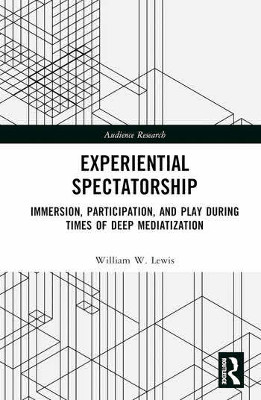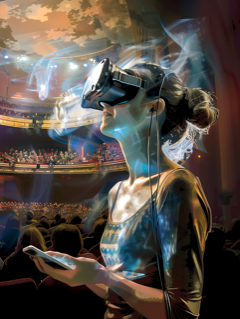Lewis's Experiential Spectatorship Published by Routledge
November 11, 2024

The Department of Theatre and Dance is proud to announce the publication of Experiential Spectatorship Immersion, Participation, and Play During Times of Deep Mediatization, a new monograph that offers insights into the ever-evolving and increasingly complex relationship between audiences and new-age contemporary media. Written by Dr. William W. Lewis, Assistant Professor of Theatre History, Literature, and Criticism, and Coordinator of Undergraduate Theatre Studies here at Purdue, this new publication provides a modern post-digital framework for understanding how audiences engage with a wide range of media experiences in today’s increasingly digital world.
In a time where traditional spectatorship is being rapidly reshaped by digital technologies, Experiential Spectatorship takes a deep dive into how emerging forms of media, from participatory theater and video games to social media platforms and interactive television, are transforming the ways we choose to engage with the performing arts. This monograph offers a digital perspective to examine audience experience across these diverse platforms, helping readers to grasp how mediatization, shaped by recent technological advancements, is redefining our decisions and capacities as spectators.
Experiential Spectatorship introduces an accessible taxonomy of four primary Architectures of Exchange; Immersion, Participation, Game Play, and Role Play, to describe how modern media formats elicit engagement from audiences. Through this framework, Dr. Lewis guides readers in understanding how participatory and interactive media challenges traditional forms of spectatorship. Rather than simply consuming content, audiences today are actively involved, shaping their experiences through decisions, interactions, and the roles they take on within a given narrative.
The concept of relational exchange between the spectator and their chosen form of contemporary media is one focus included in Experiential Spectatorship. As Dr. Lewis explains, "The term relational exchange focuses on the reciprocal relationship of the spectator to their individual media. It is about a feedback loop that emerges where what the media does impacts the spectator and then the spectator also changes the media in some way.” He further describes this exchange by saying, “When I say relational I am focusing on the way a person becomes part of the media when they interact with it. This is significantly different by degrees than when someone simply receives information from the media source."
As media influenced by digital technology, such as virtual reality, alternate reality games, and choose-your-own-adventure narratives, has become more widespread in recent years, there has been evidence of clear trends that audiences are no longer solely observers but are instead immersed, engaged, and can make choices that influence the story and possibly, the entire experience. This shift has profound implications not only for how media is consumed but also for how it affects individual subjectivity and mediatized interactions.

Dr. Lewis’ monograph also considers the broader implications of this mediatized shift, including the role of technology in the spectator’s daily life. The concept of the "mediatized spectator" is of crucial importance to the text as audiences today are influenced by the media they consume as well as how they engage with technology on a day-to-day basis. By examining and digesting these interactions, whether through social media, smartphone-based games, algorithmic tracking technologies, or other forms of experiential media, readers are equipped with the tools to critically assess how contemporary spectatorship is being shaped by an increasingly complex digital environment and will continue to change along with the evolution and adaptation of new-age participatory theatre performances and media influenced by digital technologies.
This publication is a vital resource for students, scholars, and media professionals interested in the future of theatre performance, audience engagement, and contemporary media studies. It encourages readers to think critically about how performance and spectatorship will evolve in the twenty-first century, especially as future generations, raised in a post-digital world, continue to shape new forms of media interaction.
Experiential Spectatorship Immersion, Participation, and Play During Times of Deep Mediatization is now available for purchase in both digital and hardcopies through Routledge.com and will begin to ship on November 7. A copy of the e-book will also be accessible through Purdue’s library.